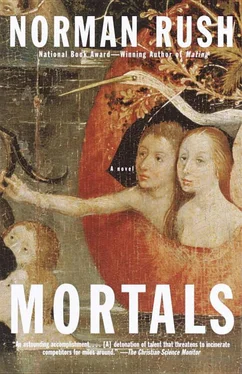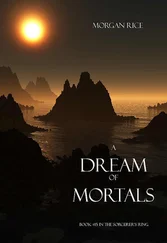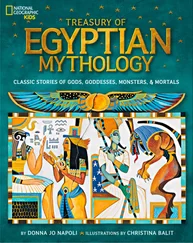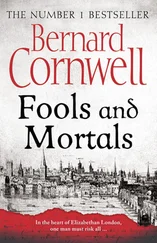Ray said, “You said you wanted to tell me about your theory of Milton and me, why the connection, I think you said.”
He had really been asleep. Morel was struggling to get himself in hand. He began preambling about how Ray had to understand he had no opinions whatever about Milton’s qualities as a poet, he had no opinions on the poetics. Some lines and passages were, he acknowledged, striking. But most of it he wasn’t qualified to judge, other than to say that it seemed like a lot of the rest of classic English poetry, which he really found got interesting only in the late nineteenth century, because so much of it was crypto-Christian apology before that.
Ray thought, That’s all I need, crouching here. All he needed was an attack on English Literature, which at that moment was giving him, Ray, two useless nothings, the phrase A Great Reckoning in a Little Room, which was by somebody about Marlowe’s death, and then the other … bits of blurred recall of Beckett’s plays, many of them taking place in settings like the one he and Morel were in. And Morel was saying again that the reason he had strong feelings about Milton came from having been forced by his father to read Paradise Lost . And then there were some disparaging remarks about Thomas Traherne and about Wordsworth and it was all too much.
“Listen to me,” Ray said, trying to be commanding.
“Okay.”
“Know what, I want to jump ahead here. Just admit this. Milton came up, or her attitude to Milton did, Milton being important to me, and you realized you had an opinion and a theory and you went for it and she thought it was brilliant. It was negative. A negative take, shall we say. You had something negative in your backpack about Milton and you used it. It was part of courting. You went … Hm , Milton. You wanted her. You took a shot. Admit it.”
“It was something like that.”
“It was the equivalent of a cheap shot, but let’s hear it. It might even be right. Just give me the Reader’s Digest version of what you said. I guarantee you I can take it. And come on, do it. By the way, if you think you hear police whistles you’re right. But it doesn’t mean the police are here to save us. Guerrillas use them for signaling between units. Or it could be the villains. But it’s not the police. So just give me a diagram of what you said.”
“Okay, but I have to stand up.” He was apologetic. He knew they had agreed that the huddled-down position was optimal in the situation they were in. But he was being asked to present something of significance. He had to be standing, to deliver his thing properly. Ray understood this from teaching.
Morel began walking around.
Ray got up. There was no way he could remain huddled like a pupil while Morel stood over him. So that was it, they would both have to risk being cut in half by heavy-weapons fire until the issue was ventilated. That was life.
Morel needed to get on with it.
“Just give me a diagram,” Ray said.
“Okay, man. Yeah, here it is.” But he continued thinking, preparing.
Unless Ray was wrong, Morel was reverting to a blacker, more plebeian speech mode, the rhythm different. It was undoubtedly reflexive, a mode that offered some sort of protection. He had seen Morel do it before, but more subtly.
Morel said, “Okay, but, man, I can’t hardly remember the whole thing, you know? Let’s see …” Ray knew Morel was ashamed of the lurid can’t hardly because he had half swallowed it to the point where it had been hard for Ray to pick up. Morel had to be embarrassed by the blunt black thing he was doing. But distress was behind it, it should be remembered. It did raise the question of who Morel was and the question of false pretenses … which, Ray realized, was a classic redundancy. And generations of linguistic professionals had looked at it and not seen it and it was exactly like rapid eye movements being discovered by a graduate student after generations of sleep experts and theorists had droned on and on, not seeing it. Typically of life he didn’t know the name of the graduate student who had finally seen it, discovered it. He should be famous. His name was Jewish, he knew that much. But that was all he knew, except that he Ray himself had used false pretenses all his life up to that moment.
A nearby blast shook them, and Morel resumed, finally.
Morel said, “No, what I said to her about Milton … in fact she probably mentioned it to you …”
“She didn’t.”
“That’s funny. She seemed to be struck by it. Well anyway I don’t know if this is anything or not, but when I asked myself why in hell you liked a poet I especially didn’t like and that I had been forced to read reams of …”
“You can stop mentioning that. It’s been established.” Ray sensed that Morel, now that he was having to present his thoughts on this subject, was feeling slightly in over his head. He had tossed something off and now he had to engage someone who had spent years confronting the Hydra of Milton interpretations, slashing at them in the privacy of his office.
Morel said, “Okay, so I asked my question and I saw a pattern. Here’s what I’m saying. Paradise Lost the great Milton thing is a parable about how terrible disobedience is, using Satan’s disobedience to God as a metaphor for disobedience generally, with Milton’s disobedience to his king in the background.
“So now of course before he wrote Paradise Lost , hey, he had joined up against the great evil of his time, monarchism, the king. He goes for republicanism, joins up with Cromwell, who kills the king but then turns himself into Hitler. Milton works in the Ministry of Propaganda. Sad thing. And Milton is doing his job writing public relations stuff defending slaughtering the Irish and getting the English deeper into the slave trade. Then Cromwell loses, falls. Monarchy comes back and Milton has to live with it. So Paradise Lost is where he takes it all back , takes back his embrace of Cromwell, of republicanism, of political dissent. Paradise Lost is how he gets himself rehabilitated. The royals love it. I think that’s about right.”
“Well, it’s too simple.”
“But hey, let me finish, man.”
“Proceed.”
Morel was hyper. He said, “So here’s where you come in. You’re at the right age, pliable. There you stand. Communism is abroad in the world and it’s a great evil and there just happens to be an instrument, like Cromwell was an instrument in his time, there happens to be this instrument that’s working against the evil of our time and the instrument is the CIA. And the agency gets hold of you just when you’re studying Milton and the sixties are happening.
“So you see an evil and you see an instrument against it and you join up …”
“If you could make it not sound so much like joining the Boy Scouts that would be better.”
“Okay. So you’re twenty-two, twenty-three, and you go with the instrument that you, well, you’re in it. And the instrument you’ve joined up with is gradually becoming Satan. You signed up before Vietnam. And there you are, in revolt against your generation, your peers, their sentiments, their ideology, because the war in Vietnam they see as pure evil and they associate the agency with it. And it gets interesting because Satan is secretly the hero of Paradise Lost , despite Milton’s intentions, Satan is the secret hero. Milton couldn’t help it. He set out to glorify obedience, but disobedience hogged all the glamour. No wonder it fascinated you, Ray. Okay, so you stay with the instrument. You have doubts after a while, the impulse to draw back, maybe, but you’re in it. Your generation is against the CIA in the most fuckingly absolute way. And they focus on the exact things in the work of the agency you disagree with and reject, yourself …”
Читать дальше












